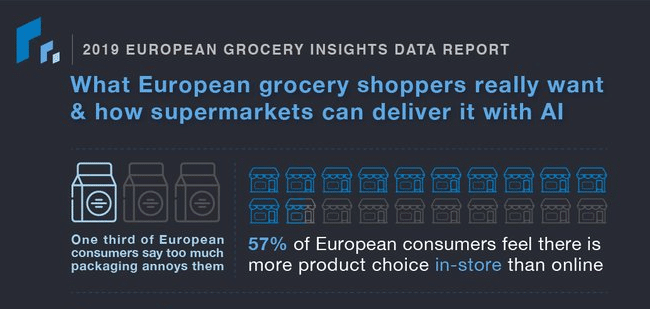
Rubikloud quizzed more than 3,000 European consumers in the report, entitled 2019 European Grocery Data Report: What European grocery shoppers really want and how supermarkets can deliver it with AI
The research showcases the extent of consumers high expectations. 88% of respondents said it’s important that retailers and food manufacturers reduce the amount of food and packaging waste, which ends up in landfill and oceans, in the next three years.
The report shows food waste is no longer just a cost issue for supermarkets, but also a reputational one. 68% of UK shoppers indicated there was no place for supermarkets who refuse to address sustainability. 71% of consumers think large supermarket groups should be legally required to produce annual reports on their food and packaging waste, with 40% saying there should be fines for those who fail to cut their waste levels.
Top 3 most progressive supermarkets when it comes to reducing food and packaging waste:
- Tesco 29%
- Morrisons 24%
- ASDA / Aldi = 21%
At a time when UK consumer spending growth has reached record lows1, the 2019 European Grocery Data Report reveals the potential impact of the ‘green dollar’ for supermarkets who don’t – or won’t – address these concerns.
More than half of all shoppers aged 16 – 34 say they feel guilty about shopping at supermarkets, indicating the amount of packaging waste produced by supermarket shopping is the key driver for this guilt.
More than half of respondents indicated they would spend more with a food retailer who has made a commitment to reducing food and packaging waste. 56% of UK shoppers said they are less likely to throw out food on the ‘use by’ date than they were three years ago as sustainability issues and education campaigns increasingly impact consumer behaviour.
The report revealed a high level of consumer understanding of the issues driving food waste in supermarkets. Shoppers identified technology as crucial to finding a solution, with more than half (56%) saying the most technologically advanced supermarkets will succeed in reducing waste. Two-fifths indicate supermarkets need to improve their stock forecasting capabilities and more than 50% said supermarkets should offer fewer price promotions (such as buy one, get one free) to reduce food and packaging waste.

“The environmental impact of food loss and packaging waste is a critical global issue,” said Kerry Liu, co-founder and CEO of Rubikloud.
Liu continued: “Retailers have long been challenged with the inefficiencies in their supply chains and promotional strategies, which lead to the product overstock and shrink that is a key consumer concern. AI and machine learning has the power to help supermarkets be better environmental stewards and reduce waste by providing them with actionable insights and improved forecasting.”
